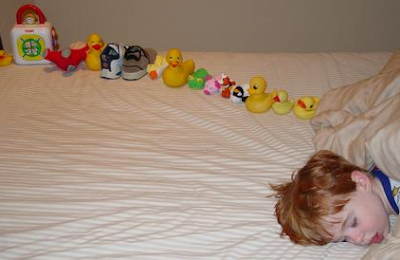What is autism spectrum disorder?
Autism is a disorder that affects the way people communicate with each other. The brain of a child with autism works differently than that of other children. Because of this, the child develops differently.Autism is often referred to as autism spectrum disorder. This is because - depending on the child - symptoms range from mild to severe.
Of every 1,000 children, two to six have autism. Boys are four times more likely to have it than girls.
What kinds of problems do children with autism face?
Autism affects every child differently, but there are common traits. These areas include:Communication
- Talking late or not at all
- Pointing or using other motions to indicate needs
- Repeating words or phases, but not understanding their meaning
- Speaking loudly or in flat tones
- Preferring to be alone
- Being interested in others, but not knowing how to interact
- Not liking to be held or touched
- Poor eye contact
- Being poor listeners and having one-sided conversations
- Trouble understanding feelings - those of others as well as their own
- Enjoying routine and becoming upset with change
- Being very sensitive to sounds, textures and other things experienced by the senses
- Being unusually attached to one interest or item
- Having tantrums or showing aggression
How will I know if my child has autism?
Talk to your child's doctor if you feel your child isn't developing normally. (An example would be if your child doesn't babble or wave bye-bye by age 12 months.) Your doctor will watch your child's behavior and look for normal developmental milestones. Finding autism early helps you get a head start on treatment. It also means better progress for your child.Treatment: Children younger than 3
Young children are referred to early intervention programs. These programs focus on specific problem areas and usually include speech and behavioral therapies. Children learn social skills and are rewarded for good behavior.Children with coordination or balance problems can work with physical or occupational therapists. Early intervention programs train parents to work with their children at home. Basic tips for parents include:
- Have set routines, at home and away.
- Give your child rewards for good behavior. For example, let your child enjoy a favorite activity when he or she does well.
- Show your child affection in as many ways as possible. All children do better with lots of nurturing.
Treatment: Age 3 and older
Special educational programs are usually available through public schools and private centers. Along with these programs, your child will probably work on language and behavior. Public schools are required to provide your child with an appropriate education. A child study team will most likely evaluate your child and set up an individualized education plan (IEP) to help with the unique challenges your child may face in school.Medications
Medications are sometimes needed to help treat behavior problems that are present in some children with autism. Children with anxiety and depression may be helped with medicine to treat these conditions as well. If your child is hyperactive, medicines used for attention deficit hyperactivity disorder (ADHD) may help.What will happen to my child?
Although people don't "get over" autism, many adults can live on their own and hold jobs. Their success as adults depends on their intelligence and personality, and how they get along with others. Adults with severe autism symptoms will need assistance throughout their lives.SOURCES:
- Autism Society of America. What's unique about Asperger's disorder?
- National Center on Birth Defects and Developmental Disabilities. Autism spectrum disorders
- Autism Society of America. What are autism spectrum disorders?
- National Institute of Mental Health. Autism spectrum disorders (pervasive developmental disorders).
- National Institute of Child Health & Human Development. Autism spectrum disorders (ASDs).
